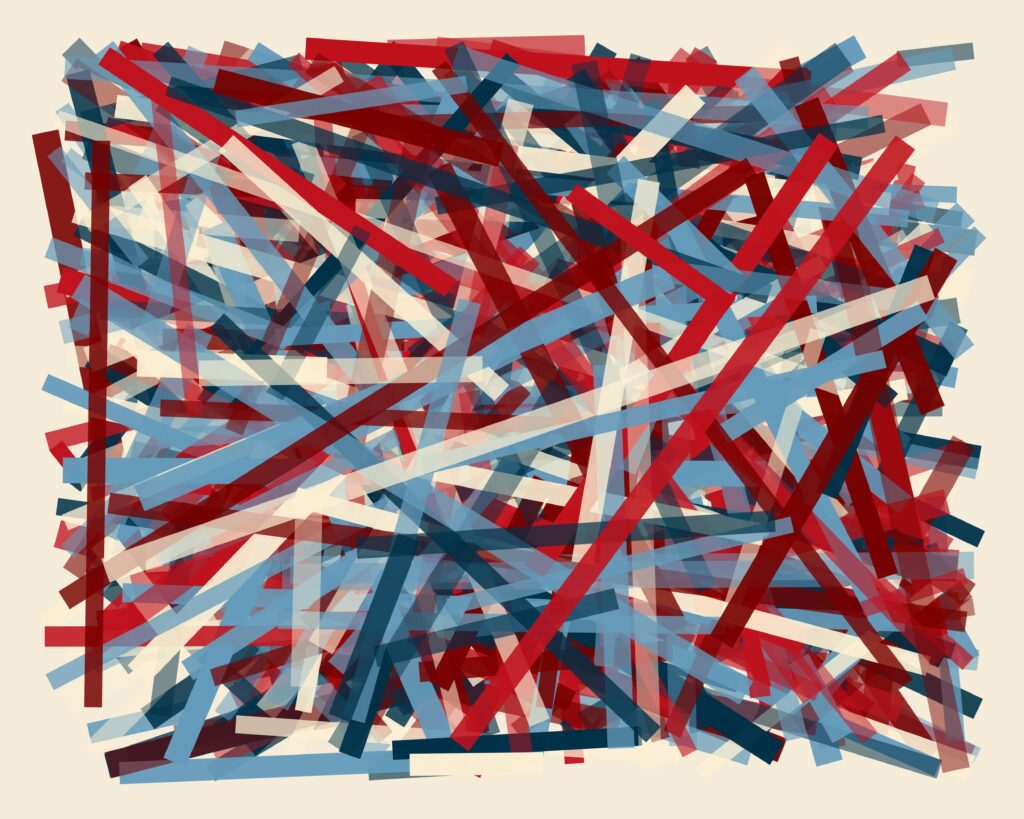I often tell people that I feel like I have the best job, able to listen and learn from people who are way smarter than me as I interview them for Franciscan Media’s Off the Page Podcast. Editing the episode can be its own lectio divina (sacred reading) experience as I allow a guest’s words to sit even deeper in my heart. And in times of difficulty, I often find myself returning to past conversations, contemplating the words and wisdom of someone I’ve interviewed, hoping it can help me make sense of life and the world.
That has certainly been the case these past couple weeks. Maybe you’re like me and have been reeling over the undeniable rising political violence in the United States and the divisive rhetoric that seems to inevitably follow national tragedy. Our illness as a society has risen to the surface in a way that for me is impossible to ignore. Where did we go wrong? How can we stop this downward spiral into the abyss?
Recent guests on Off the Page have made me wonder if ideology is at the root of our illness and if awareness of our inherent relationship with one another is part of the cure. As podcast guest and The Shack author Wm. Paul Young explains, ideology comes from the “tree of the knowledge of good and evil” because it is often animated by fear—the same reason Adam and Eve ate the proverbial fruit. But Scripture tells us that “there is no fear in love” and “perfect love casts out fear” (1 John 4:18).
The unfortunate thing in our current age is that fear “works.” It gets boosted by social media algorithms that thrive on division. Fear and grievance apparently gets politicians elected. It’s cognitively addictive. But it doesn’t work in a spiritual sense, and it will take something spiritual, I think, to heal our illness as a society.
I hope the wisdom from these recent guests on Off the Page can help us address what is spiritually wrong at the crux of our society and return to an awareness of who we already are.

Primacy of Relationship
Ideology almost always leads to trading “relationship” for “rightness.” It’s no wonder I’ve heard countless stories in recent years about politics breaking up friendships and families.
In Ep. 13 of Off the Page, Sister Margaret Carney, OSF, talks about the “primacy of relationship” being a cornerstone in Franciscan leadership and living. This is where I feel the Franciscan way has much to offer to our country, no matter a person’s background or beliefs.
Foundational to a Franciscan theological framework is relationship. At the core of reality is the Trinity—the Father, Son, and Spirit in perfect, humble, self-giving relationship with one another—which forms a “fountain” (Bonaventure) of love and goodness that flows perpetually into our world and our lives for us to be in relationship with as well. This may sound like fancy theological speak, but it has practical implications.
The Trinity means we live in a fundamentally relational, not ideological, reality. The incarnation shows that God will go any length to be in relationship with us, and therefore, as Carney shares, we must learn to love who Jesus loves.
“I have a cousin,” she says, “who belongs to a Methodist congregation that’s doing a lot of work in this area [peace building] that we were talking about—and how they have dealt with the various exclusions churches are experiencing: LGBTQ persons, or perhaps excluding people of a certain political persuasion, or, in their case, the kind of Christian nationalist evangelicals.
“She said, ‘Our pastor says over and over: you will never meet a person for whom Jesus did not die.’ That stops me cold. If I can look at someone and say, ‘Oh my, Jesus died for you as much as for me,’ then I better shut up and listen to that person.”
Notice how the exclusions she’s referring to flow from ideology—conservative Christians excluding the LGBTQ community and progressive Christians excluding Christian nationalists—while the cross brings us back to relationship: affirming the human dignity of those we’re excluding, then daring to listen to their stories and beliefs.
In an American context, we sense a relational paradigm in our country’s motto, e pluribus unum (“out of many, one”), or the unifying notion I grew up with that “We may vote differently, but we’re all Americans.” This is also why great progress and social change in our society has been rooted in nonviolence. We are inherently connected to—and in relationship with—one another, even those yet to awaken to this connection. Unity in diversity is a uniquely American aim.
In Ep. 21 of Off the Page, The Shack author Wm. Paul Young speaks to the popular notion of “boundaries,” which can lead to exclusions. “I think ‘boundaries’ is too slick of a word sometimes,” Young admits, not referring to situations of abuse where boundaries are often necessary. “The idea of boundaries often times exists because it’s easier [to create boundaries] than to actually love that person.”
And so, whenever a politician I disagree with wins an election, or whenever a popular movement arises in our culture, it’s my job not to demonize those who support a person or movement as “stupid” or “evil” (boundary-making) but to get curious about the movement itself, to “read the signs of the times,” as goes the great wisdom from Vatican II.
I am in relationship not only with the people around me who I wish to exclude but also with the forces forming the culture in which I live. Ideology leads me inward to focus on my own “rightness.” Relationship leads me outward into curiosity, listening, and affirming the human dignity of the “other,” even if I still disagree.
Which leads us to dialogue.
Dia-Logos
Never had I considered the etymology of the word “dialogue” until peacemaker and Theory of Enchantment founder Chloé Valdary deconstructed the word in Ep. 20 of Off the Page.
Dia (through). Logos (word, reason, discourse).
In Greek philosophy, dia-logos was a dialectical method where critical exchange “through words” led to deeper insights and the discovery of truth. This process makes a lot of sense, that is, unless you believe you have the answers, which is also a type of fundamentalism. If you’re cringing at the thought of dialoguing with the person you disagree with, you are likely caught in the tangled web of ideology.
Even if history reveals that you do have the “right” ideas, exchange and debate, especially in our Information Age, is the best way to make good ideas accessible to others so real change can unfold. Exchange and debate are also the best ways for bad ideas to be exposed. Practically speaking, whereas fear-based ideology drives division, the dia-logos that flows from relationship is also how you earn the trust of the pragmatic center and win elections.
As a Christian, I take dia-logos even further. Just as the author of John’s gospel makes the philosophical leap in the prologue to say that Christ is the logos, the Word which holds all things together, I would suggest that it’s through relationship—and the dialogue (and silence) flowing from this mutuality—that we experience the Christ. I’d argue that it’s through the mutual giving and receiving of words—of ideas, of reason, of stories—that we deepen our awareness of the Word, the logos, that which holds all things together, in all its unity in diversity.
Referencing the cognitive scientist John Vervaeke and Jesus’s words in Matthew 18:20 (“For where two or three gather in my name, there am I with them”) Valdary shares in Ep. 20, “The art of dia-logos is to be in relationship with someone in such a way that you recognize their constantly unfolding nature.”
Does the Body of Christ only consist of people who agree with me? If so, then I’ve constructed Christ to be in the image of myself.
The Trade Off
Relationship—and the dialogue that flows from it—is never easy.
Sister Margaret Carney, in Ep. 13, shares that Francis and Clare were born into a time period when there was a shift in consciousness within Western Europe from a hierarchical society to more blurred class boundaries with the rising importance of trade, finance, and commerce. She notes that as Francis and Clare formed their own communities, they leaned on the wisdom of the Benedictines, where everyone in their religious community had a voice.
Says Carney: “The Benedictines have this wisdom that you may not get the decision you want right away, but you stay at it until there’s been enough discussion, enough thought, enough prayer, that eventually, 99% of the time, you will get harmony.” Sounds like democracy.
Similar to these shifting dynamics of the Middle Ages, social media today has given everyone a voice. Even more complex in our age is to realize we’re in relationship with those who we hardly know or do not know at all. Sometimes in my bafflement for the state of our country, I am tempted to post something that, on second thought, I realize is quite condescending toward a large portion of the country, something I would never say face-to-face to a friend who disagrees with me politically.
This is a type of categorizing that flows from rigid ideology.
Social media is where a more subtle form of “boundary-making” unfolds. Dualistic black-or-white thinking (which our social algorithms love, by the way) divides reality into “goodies” and “baddies”—a Star Wars-esque worldview of “good” and “evil.” There is indeed evil in the world— and in our country—but elevating human dignity entails realizing that the majority of people are far more complex than our caricatures and are generally trying to do the best they can. Categorizing clouds our awareness of our connectedness to one another.
As HBO’s Real Time host Bill Maher so often says, “Maybe you can’t stand the president, but you can’t hate half the country who voted for him.” This is the kind of relational awareness that must be resurrected today.
The Franciscan way invites us into the transformative notion of fraternitas—community bound by love, humility, and mutual respect—that reflects the relationship of the Trinity. There is nothing easy about fraternitas. But this kind of mutuality and respect can even contain heated exchange and chaos, which becomes its own dance toward the truth: dia-logos.
As I wrote recently in a piece for St. Anthony Messenger, referencing philosopher Peter Rollins, the inability to have this kind of dialogue and healthy conflict is a type of war. Though we think of war as conflict, war is actually the absence of conflict. Unable to have meaningful and constructive dialogue (conflict), one party decides the other must be eliminated (war).
Let’s prioritize relationship over ideology, before we move any closer to an edge from which an unending free-fall awaits.


